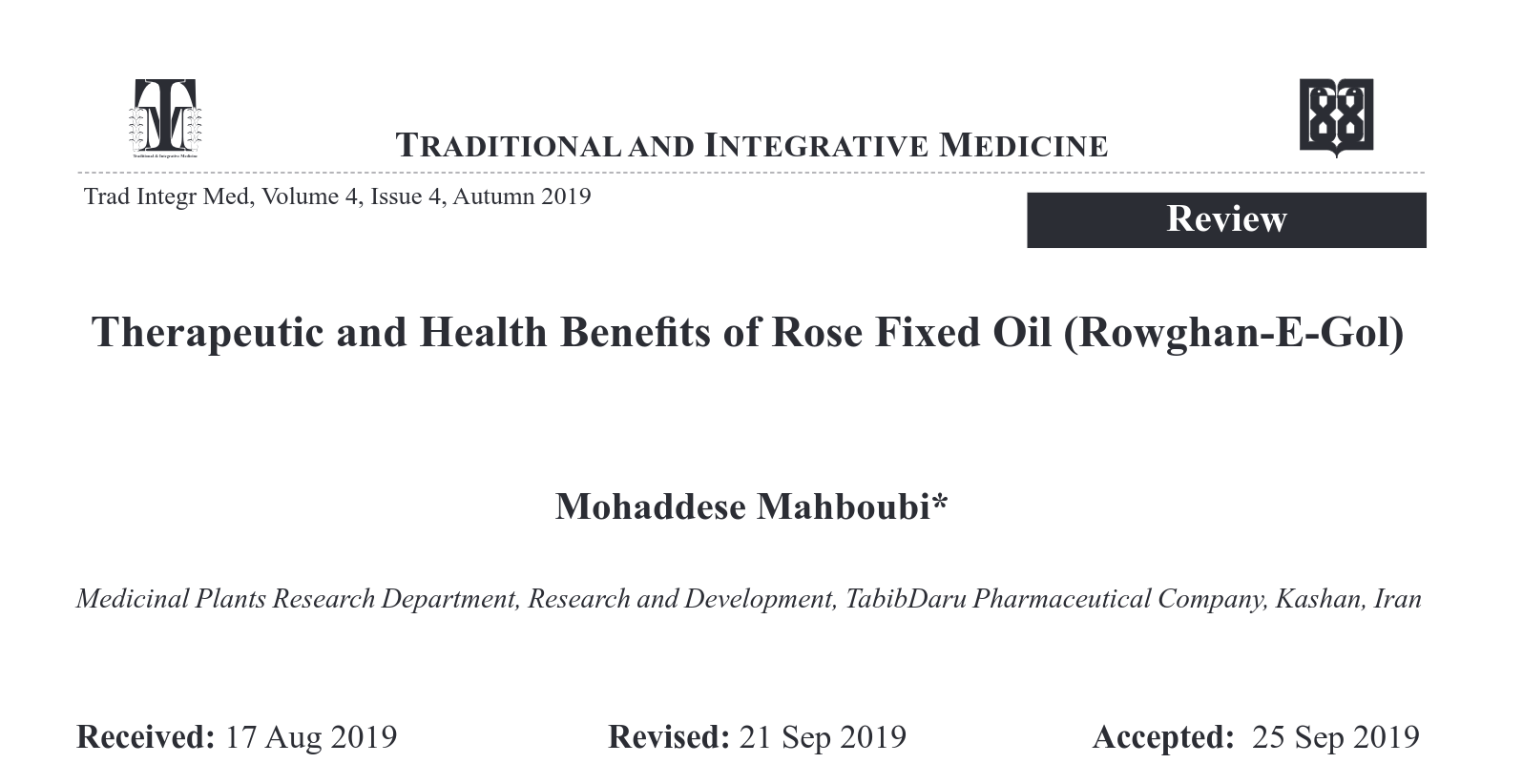Rose

Botanical Name: Rosa damascens
Unani Name: Ward, Gulab (1)
Taste: Astringent, Bitter
Mizaj: Cooling & Drying (1)
How it is used Medicinally
Actions: Tonic, mildly astringent, carminative, aperient, and stomachic.
Therapeutic uses: Reduces inflammation, (mild) laxative, diuretic, gargling for sore throats, diarrhea aid, eases both menstrual complaints and hemorrhages (1).
Dosage/Application:
- Rosehip Tincture: diarrhea and colic relief (2)
- Rosehip syrup: cough remedy and a good source of vitamin C (2).
- Rosehip decoctions: chronic diarrhea with stomach weakness
- Cream: for dry and inflamed skin
- Lotions: vaginal itching/dry skin
Popular Unani Formulations:
- Majun Dabidul Ward
- Roghan Gul
- Ruh-E-Gulab
- Sharbat Gulab
''Petals of R. rugosa were evaluated for their cytotoxic effect against cervical (HeLa) and breast cancer (T47D) cell lines and for antiradical activity (with DPPH•). As a result, significant cytotoxic (up to 100% of dead cells) and antiradical properties (IC50 1.33–0.08 mg mg−1 DPPH•) were demonstrated.'' (3)
How Rose is used in Unani Tibb.

This is a difference between rose essential oil and rose oil. Rose oil, otherwise known as Rowghan-E-Gul is a profound medicine within the Unani Tibb culture. Here is my summary of this research article.
- Unlike rose essential oil, rose oil is used orally and topically.
- It has traditionally been used to treat: hemorrhoid, inflammatory bowel disease, earache, and gastro-esophageal reflux disease.
The Four Methods of Producing Rose Oil.
Method #1 - The Sunlight Method
Fresh rose petals are mixed with olive or sesame oil. This mixture is left under the sun until the leaves turn white. The mixture is then pressed (to get every last bit of the goodness from the petals) and the ''mud'' or solid parts are discarded. This step is repeated 7 times (with 7 lots of fresh petals) to get a rich and potent rose oil.
Method #2 - The Boiling Method
Equal amounts of oil and rose petals are boiled over heat for a long time. It is then filtered and the oil is kept.
Method #3 - The Water then Oil Method
Fresh rose petals are boiled in water first. Once its been boiled, the filtrate is mixed with oil and boiled a second time until complete water omission (meaning no more water is left).
Method #4 - The Grinding Method
The petals are grinded and squeezed together until liquid (oil) is produced from the petals. After, the petals and oil are added to sesame oil and boiled until pure rose oil is produced.
Rose Oil in Practice
The dosage of Rose Oil for Oral Intake - is 20-30g in liquid form and 1000mg as a soft capsule. It is taken 1-4 times per day (depending on the condition). It is highly recommended to seek out a qualified Unani Physician to determine if this is the right medicine for you and what dosage you would need.
Actions -
- Dissolvant
- Astringent
- Purgative
- Anti-inflammatory
- Analgesic
Therapeutic uses -
- Opening the ducts (when there are obstructions).
- Stops diarrhea caused by excessive yellow bile.
- Calminative effects (for stomach inflammation, intestinal ulcers, and cramping).
- Teethache and Earache.
- Topical application for migraines, sweating, insomnia, and cold phlegmatic inflammation of the stomach. (It can be mixed with vinegar when applied to strengthen its penetrative effects).
- Used on sight of injury (for a number of days to enhance healing in the area).
- Massaged onto baby's spine to prevent infertile colic.
- Irritable Bowel Disease.
Other Resources




Reference:
- Chishti, Ghulam Moinuddin. The Traditional Healer's Handbook: A Classic Guide to the Medicine of Avicenna. Inner Traditions/Bear, 1991.
- Ody, Penelope. The Complete Medicinal Herbal. Dorling Kindersley, 1993.
- Nowak, Renata, et al. "Cytotoxic, antioxidant, antimicrobial properties and chemical composition of rose petals." Journal of the Science of Food and Agriculture 94.3 (2014): 560-567.
DISCLAIMER: Shifaa Khan's content is for general informational purposes only. It should not be used to self-diagnose, and it is not a substitute for a medical exam, cure, treatment, diagnosis, prescription, or recommendation. It does not create a doctor-patient relationship, a consultant-client relationship, or a practitioner-client/patient relationship between Shifaa Khan and you. You should not make any change in your health regimen or diet before first consulting a physician and obtaining a medical exam, diagnosis, and recommendation. Always seek the advice of a physician or other qualified health providers with any questions you may have regarding a medical condition. No presentation or communication shall expressly or implicitly bind any person or entity to any contract, agreement, or course of conduct or waive any part of this disclaimer, and no one should rely on unverified claims that Shifaa Khan is part of any endeavor and all such reliance is expressly disclaimed.




